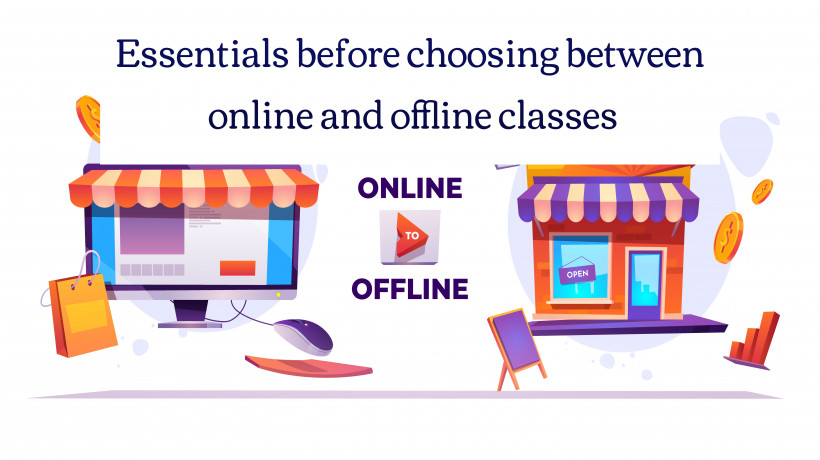Essentials before choosing between online and offline classes
Students and Professionals, who are thinking of learning or taking up an up-skilling course always get confused whether to choose an online or offline learning platform. In this article, I will explain crucial factors before selecting the mode of course.
October 26, 2021

Career Expert & Blogger

Offline training has been the dominating medium for a long time and for a good reason. But in recent years, online training has been gaining traction due to ample of new platforms and popularity of internet. In last 5 years, companies like Coursera, Udemy, YouTube, MIT open course, Stanford online etc. has helped lakhs of professionals to learn top courses from world’s best faculties at a very low cost. You can learn anything, anywhere with the power of these video contents. So, what’s the future looks like? Will it be dominated by online sessions and will offline learning become thing of past? Spoiler alert! It’s not. Offline training will continue to dominate for at least 30 years, till we find an alternative to brick & mortar classroom experience.
What are the benefits of online vs offline education?
We use many web sites to get new knowledge and learn new things.
We cannot overlook the value of offline study compared to online study, even though online learning has become the most popular method of instruction. We use many digital learning platforms like YouTube, Coursera, Udemy, and Wikipedia for understanding concepts. Also, it’s an affordable, time-saving, and convenient way as we don’t need to travel to attend classes.
The active involvement of students in the learning process is ensured by offline learning. If pupils are paying attention or not, teachers can readily determine this. Additionally, some students discover that taking classes in person helps them remember and retain information. Instead of online training, they receive offline training to develop their abilities.
Offering a hybrid learning solution that includes online and offline classes as a part of learning makes sense given the numerous advantages of both learning alternatives.
Here’s the difference and comparison of Online and Offline training:
1. The Difference- Online and Offline Coaching: A key difference between courses in these two scenarios is in timetabling – on-campus courses that have moved online retain the scheduled teaching slots throughout the week, whereas fully online distance learning courses are planned around weeks of study. This then has a huge impact on the expectations of teacher and students. When you take out that schedule and plan for asynchronous fully online teaching, you plan for a series of structured learning activities that students have to complete within the week, rather than at specific times. This shifts the focus on to what the students are going to do each week, rather than what they are going to attend.
2. Comparison between Online and Offline Coaching: Both online and offline coaching is a desirable means to prepare for exams. While some prefer the ease of online coaching, many others prefer exclusive offline coaching. Both of these have their own advantages and disadvantages which may or may not be a deal-breaker for you.
a) Portability: This is the one factor that has single-handedly led to the rise of online apps for the coaching needs of the aspirants. If you are using online apps for coaching such as UPSC Pathshala, Unacademy, Byju’s, etc. then you will agree to the fact that the level of portability makes the option of online classes a big hit. You can view your classes of any subject, any time in the comfort of your home, this makes online coaching the best option.
The same facility is not available in offline coaching as you have to be physically present at the venue for classes. Along with that, it is more time-consuming as you will have to commute to the place where the class is being conducted.
b) Clarification of Doubts: If you are learning something new, doubts are bound to arise. If the doubt is not solved, then understanding other related topics would become difficult. When you are in an online class, you have to message the teacher online, and the teacher then has to read that message to understand the doubt. All of this is a bit tedious and time-consuming. However, if you are attending offline coaching, then the same can be done in an instant.
Along with that, the doubt is cleared in a better way as you can directly ask the teacher and can have a discussion with him later about any other doubts or topics. Such flexibility is not available in online coaching. So, if you often have doubts, then offline coaching should be your choice.
c) Fees: In India, a majority of students can’t afford to pay a high fee. When it comes to money, offline coaching is costlier than online coaching. The reason for the same is the expenses incurred by a coaching centre for offline classes.
For online classes, you only need a camera and a whiteboard. Whereas, for offline classes, you need a huge space where you can accommodate all the students at once. As the cost of renting such rooms is high, and there are other maintenance expenses that are recovered from the students, the fee charged for such classes is higher than their online counterparts.
d) Realistic Environment while Giving Tests: Giving tests while preparing for exams is an extremely important practice if you want to excel in the exam. Taking part in a test series is a good way to check your preparation and knowledge and identify the areas that need to be focused upon. If you take online coaching, then you can attempt online test series which is very convenient as opposed to the offline ones.
However, if you attempt offline test, then you get a similar experience to that of an actual examination along with tight time constraints that will make the test more realistic and effective.
e) Better Reach: Location is a very important factor to be taken care of while selecting a coaching centre for exams preparation. A coaching centre located close to your house is a good choice as you will save time that would have been wasted to commute.
In online coaching, you do not need to worry about the distance; you can attend online classes from any part of the world. Hence, if you live in a place away from the coaching centres, then, online coaching is the way to go.
f) Need of Resources: Though online coaching is a boon for many as there are many advantages, you need a good internet connection to attend the same. If you reside in an area where internet connection is not good or unavailable, coaching centres are the only option if you want to prepare for your exams. While you need a good internet connection along with a smartphone or another electronic device like a laptop or a tablet for online coaching; you only need a teacher, a room to sit and a blackboard to study in case of offline coaching.

Conclusion
Online mode of education cannot form a student-teacher relation. Though online classes have many benefits. A student can learn and practice a huge data from his place itself. But it cannot fulfill the needs of a student instantly like a teacher sitting in front of him can do. We say Kids love technology; but they also love legos, scented markers, books, and mud puddles. It’s all about balance. Being a student or a parent, you should make sure that you balance both the methods of gaining knowledge.

